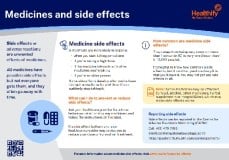You can now add Healthify as a preferred source on Google. Click here to see us when you search Google.
Ascorbic acid
Also called vitamin C
Key points about ascorbic acid
- Ascorbic acid is a supplement used to prevent or treat vitamin C deficiency (scurvy).
- Most people get enough vitamin C from a healthy, balanced diet. However, for some people, ascorbic acid from the diet is not enough and tablets are needed.
- Find out how to take it safely and possible side effects.

Ascorbic acid is the chemical name for vitamin C, a vitamin your body needs for several important jobs.
It’s water‑soluble, which means your body doesn’t make it and you need to get it from food or supplements.
It’s used to prevent or treat vitamin C deficiency, including scurvy – a condition that occurs when there isn’t enough vitamin C in the diet. It may also be recommended to help your body absorb iron, but there is limited evidence to support this.
In Aotearoa New Zealand, ascorbic acid is available to buy over-the-counter in supermarkets, pharmacies and health stores. Ascorbic acid tablets (100 mg) are available with a prescription written by a prescriber.
There are many different strengths of ascorbic acid available to buy. These also come in different forms such as tablets, capsules, effervescent tablets, liquid sachets etc.
Ascorbic acid is also found in many multivitamin and dietary supplements. These usually have small amounts of ascorbic acid and may not be enough for you. Talk to your healthcare provider or pharmacist about which supplement is best for you. The following is a guide:
- Preventing deficiency: For the prevention of scurvy, the usual dose for adults is 25 mg to 100 mg once a day.
- Treating scurvy: The usual dose to treat scurvy in adults is 250 mg to 1000 mg daily, divided into 1 or 2 doses per day.
Always take your ascorbic acid exactly as your healthcare provider or pharmacist has told you. The label on your medicine will tell you how much ascorbic acid to take, how often to take it and any special instructions.
- Take your ascorbic acid at the same time each day with a large glass of water.
- Check the packaging for how to take ascorbic acid you have bought over-the-counter as some forms are chewable and some need to be dissolved in water first.
- Food: You can take ascorbic acid with or without food.
-
Missed dose: If you forget your dose, take it as soon as you remember. But, if it's nearly time for your next dose, just take the next dose at the usual time. Don't take double the dose. If you have trouble remembering when to take your medicines see tips to help you remember to take your medicines regularly. You might find a medication reminder app helpful.
Side effects caused by ascorbic acid are rare. If you're concerned about any symptoms you think might be related to your medicine, talk to your healthcare provider. The following information offers some guidance but doesn't include all possible side effects.
Tell your healthcare provider if these side effects bother you.
- Sore tummy, nausea (feeling sick) or diarrhoea (runny poo): Try taking your ascorbic acid with food or dividing your dose throughout the day.
- Indigestion: Try taking your ascorbic acid with food and don’t lie down for 30 minutes after taking your dose.
- Urine colour change: The colour of your urine may look brighter orange or yellow. This is normal and nothing to be worried about.
Read more about medicines and side effects and reporting a reaction you think might be a side effect.
The following links have more information on ascorbic acid. Be aware that websites from other countries may contain information that differs from New Zealand recommendations.
Vitamin C and your health(external link) HealthDirect, Australia, 2024
Brochures
5 questions to ask about your medications(external link) Health Quality and Safety Commission, NZ, 2019 English(external link), te reo Māori(external link)
Medicines and side effects [PDF, 91 KB] Healthify He Puna Waiora, NZ, 2024
References
- Ascorbic acid(external link) New Zealand Formulary
- Ascorbic acid(external link) New Zealand Formulary for Children
Brochures

Medicines and side effects
Healthify He Puna Waiora, NZ, 2024

5 questions to ask about your medications
Health Quality and Safety Commission, NZ, 2019
English, te reo Māori
Credits: Healthify editorial team. Healthify is brought to you by Health Navigator Charitable Trust.
Reviewed by: Angela Lambie, Pharmacist, Auckland.
Last reviewed:





